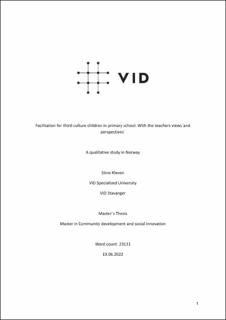| dc.description.abstract | The study aims to look at how primary schools make third-culture children feel like they
belong rather than longing to belong, as well as how teachers assist in integrating their views
and perspectives. We live in a multicultural society in a rapidly changing world as a result of
globalization and immigration. There are always more multicultural children in a classroom.
It is therefore critical that teachers understand how to implement their education and
knowledge to assist multicultural children, particularly TCKs, in feeling integrated into
society. Norway has educated citizens who are aware of different cultures and backgrounds.
Children from three different cultures are referred to as third-culture kids. There are three
types of cultures: host culture, home culture, and a mix of the two.
TCKs struggle with issues such as identity, where home is, and where do I fit in, as well as
language barriers, different cultures, and norms. TCKs, on the other hand, have a unique
perspective on the world and different cultures. People are not judged based on their
background. TCKs have a variety of assets that can be used in the classroom to benefit other
students. These are just a few of the advantages that TCKs have. The relationship between
TCKs and teachers is critical; it is the key to successful integration and giving TCKs a sense of
belonging.
The assignment delves into topics like integrating, globalization, multicultural education, and
intercultural education, as well as how these actually impact TCKs' positive integration into
their new society. I used qualitative data from four teacher interviews and quantitative data
from texts and articles. However, I plan to use the interviews to determine whether or not
schools and teachers support TCKs, and then back it up with texts and articles.
It is critical for teachers to gain the necessary knowledge in order to teach TCKs. That is why
their education program is critical in providing them with the necessary tools and support to
succeed as teachers in multicultural classrooms. | en_US |

